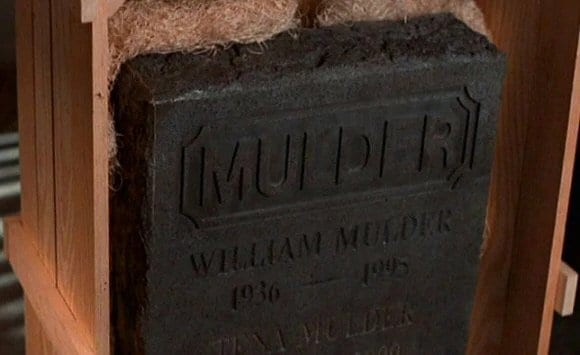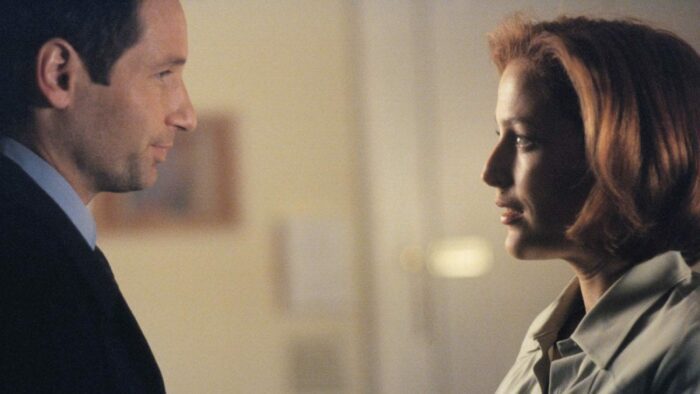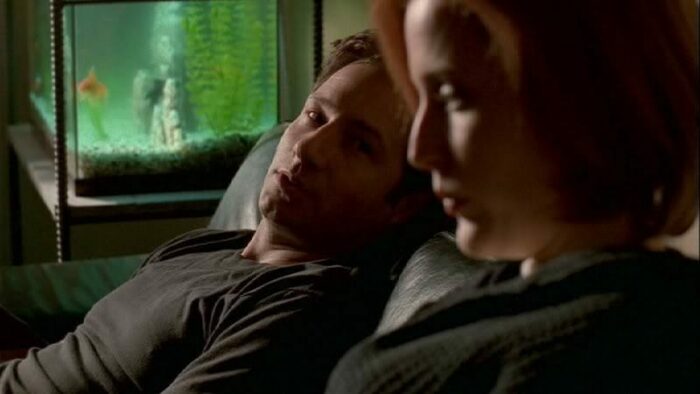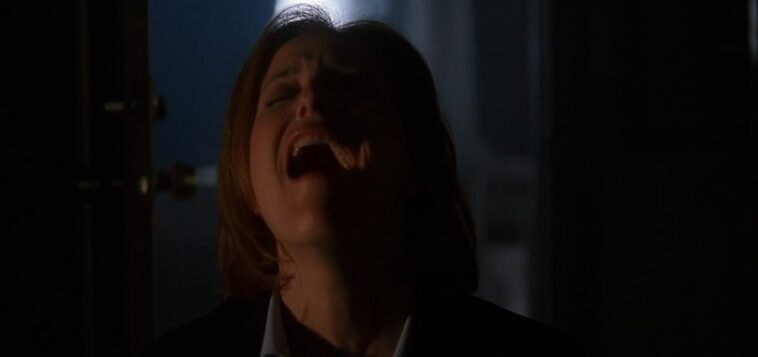For many a fan of the MSR (Mulder-Scully Romance), there exists no eighth and ninth season of The X-Files in conventional terms. While such fans appreciate aspects of the second movie, I Want to Believe, and the subsequent revival seasons, for them the classic era of the series ends with ‘Requiem’.
The seventh season finale was the natural break point for The X-Files. The story came full circle from the ‘Pilot’ episode, returning to the same town and characters. It could have concluded the final lingering strands of the alien mythology with some kind of grand showdown in Bellefleur, Oregon, and allow Fox Mulder and Dana Scully a semblance of the happy ending the season appeared to be delivering. Across Season 7, their relationship had evolved and matured to a point of mutual acceptance, with both Mulder and Scully ready, in their own ways, to walk away from their FBI partnership and into a life together. “What exactly is left to investigate?” an auditor asked Mulder in ‘Requiem’. About their romance? Not much, it seemed.
Fate, nonetheless, had other plans. Fox wanted to continue the latent phenomenon that was The X-Files, conscious of the lucrative IP at their disposal, and were quite prepared to do so even with David Duchovny determined to walk away and leave Mulder behind after the character is abducted by aliens. Chris Carter, not wanting to abandon the series he had created and curated for seven years to an assigned new showrunner, opted to continue on and develop what would become a new, post-Mulder iteration of the series, at least ostensibly. Scully would gain a new partner in dignified, out of his depth agent John Doggett. She would be forced to continue working on the X-Files and continue Mulder’s work with him gone, possibly even dead. And from a conceptual point of view, The X-Files would retain the same fusion of procedural investigative drama and mythological soap opera it had been for years.

The MSR, however, did not just live on into the eighth season but mutate from complementing the familial series mythology into rather becoming it entirely. Season 8 contains, almost remarkably, the most tightly plotted mythology arc the series ever produced. Whereas the Syndicate-era mytharc was an unformed, chameleonic mess of fascinating ideas, often designed to morph into whatever plot suited it, the ‘supersoldier’ mythology of Season 8 has a very clear and direct through line between season premiere ‘Within’ and season finale ‘Existence’. It is a line that begins with Mulder and Scully wedged apart and ends with them joined together. The last shot of ‘Existence’ could also, in other circumstances, serve as the final moment of the show—Mulder and Scully united, holding their newborn baby, as a family; one possible culmination of the ‘mythology of the MSR’ that contains, amongst fans, multitudes.
Season 8 mostly, however, frames the MSR through the sudden shock of tragedy, particularly from the comfortable, secure moment of contentment we saw between Mulder and Scully in ‘Je Souhaite’. “I’m fairly happy,” Scully reports, and that understatement is a significant moment for her, after years of turmoil, illness and loss. The end of ‘Requiem’ upends that stability in the most violent of ways. Mulder vanishes and Scully finds herself, against all medical odds, pregnant. The MSR at this point transmogrifies. Mark Snow creates ‘Scully’s Theme’ for ‘Within’—a yearning, mournful elegy to the life torn away from her, and the security and faith she had found in her relationship with Mulder. The FBI seize an opportunity to tighten control on Mulder’s work. The air of paranoia around the FBI grows palpable in a manner it hadn’t been for seasons. Assistant Director Skinner, by default, becomes a closer ally, even a confidante, but he cannot provide Scully with the solace she needs as Mulder’s absence upends her life.
‘Within’ shakes the foundations of Scully’s faith in Mulder. She always knew he was a man of secrets, even as he worked to uncover them. Scully never truly understood Mulder’s relationship with Diana Fowley, much like the audience. Doggett plays up to this, questioning her knowledge of Mulder’s life in a first scene that is intentionally uncharacteristic of the man he would become. “There are women in the Bureau he would confide in”. It might just be talk but Scully can’t quite bat this away, not after Fowley. There is a seed of doubt. “I doubt we agents ever truly know each other, even our partners. Not at the end of the day. Their real lives, friends, girlfriends, deeply personal things, issues,” Doggett suggests, and Scully’s realisation that Mulder was dying as a result, unsaid but assumed, of the brain surgery performed on him to extract awakened alien genetic material in ‘The Sixth Extinction II: Amor Fati’, adds further uncertainty. “How well did you really know him? How far would Mulder go?” Doggett asks as he tries to paint a picture of an enigmatic figure not even we, as the audience, ever knew as well as we thought, let alone Scully.

Now, on a personal level, I have never warmed to the ‘Mulder was dying’ idea introduced here as it is very clearly a retcon devised after his abduction, and after Carter and Frank Spotnitz had figured out the supersoldier mythology, designed to serve Season 8’s narrative. It makes little sense in the context of Season 7 Mulder as we saw him. “There’s a clear record of his decline,” Scully claims as she learns he was going to doctors for a year, but this was never once even suggested across Season 7. One could extrapolate that Mulder’s keenness for Scully to quit the FBI in ‘Requiem’ now has a different context, as a man who knew he didn’t have long left and didn’t want her there to see him fade away, but it makes less sense than Season 7’s thematic arcs I have previously discussed. Nothing across Season 7 even hints at health issues, let alone decline, in Mulder. He looks healthier than ever, happier than ever, especially after ‘Closure’, and ready to even contemplate a life with Scully beyond that of a partner. His actions are not those of a dying man. It never rings true.
What these choices do, however, is make Mulder the X-File himself in an even deeper manner than he was in the ‘Biogenesis’ trilogy, and what was an undercurrent of MSR now becomes an open secret. ‘Per Manum’ adds deeper context to much of their relationship across Season 7, as flashbacks reveal a renewed determination of Scully to become pregnant through artificial means, with Mulder as her chosen sperm donor, after she breaks the news about her stolen ovum from ‘Memento Mori’. The idea that Scully cannot emotionally accept never being a mother makes sense, as we have witnessed such instincts since at least ‘Emily’ in Season 5 and possibly even before. Part of Scully’s innate confliction about working with Mulder is thanks to her anxiety that being with him might not translate into the expected normality of family life, the kind of life she came from with secure, loving parents and numerous siblings, nieces and nephews. Scully struggles with the yearning for social acceptance through motherhood, more so than marriage or partnership, than Mulder ever does.
This is perhaps why Mulder, though he is happy to be the donor, voices a note of caution: “I just wouldn’t want this to come between us.” This speaks to an anxiety about Mulder in relation to the MSR that doesn’t always seem apparent—that Scully might not want him to play the role of father, if her child has been artificially conceived rather than part of a sexual union with him. As Season 8 develops, and Scully transitions into the X-File as opposed to Mulder, these concerns take on increased Judeo-Christian mysteries, but for now we are left with Mulder’s uncertainty about what a child means for a relationship they have just, in truth, discovered. One suspects these events take place after their presumed sexual congress in ‘all things’, during the last third of the season, as the MSR reaches that point of secure consolidation. Why wouldn’t Scully now want children with the man she loves? Her disappointment at the thought Mulder might be letting her down in ‘Per Manum’ is palpable. Would she want a baby with anyone else? Would she want one alone?

Knowing this, the tragedy of the MSR across Season 8 becomes all the more acute, as Mulder returns dead in ‘This Is Not Happening’ and Scully spends three months subsequently having to recalibrate her expectations in the last few months of her pregnancy. When Mulder, miraculously, turns up alive once more, Scully asks him if he has any idea what he’s been through. “No but I see it on your face,” he replies, and in that moment the central driving narrative of the season transfers to Scully both narratively as well as emotionally. She has carried the fear Mulder might have been taken from her just at the point they found one another for almost a year now, as she has carried a child she considers theirs. She has faced the anguish of raising the baby to never know his ‘father’. Now, with him back, Season 8 can logically pivot toward this tragedy evolving into the continued fear of their family being torn apart, so thematically the season carries on down the same path. Scully moves from worrying about Mulder to everyone else worrying about her and her baby.
The series does get the opportunity to play on expectations and how the internal series characters themselves wonder about Mulder and Scully’s dynamic. The Lone Gunmen in ‘Three Words’ openly question the pregnancy, as close friends would do, as they’re glad to see their friend alive. (“And not just because we got big questions about your involvement in a certain…blessed event,” Langly jokes.) Neither Mulder and Scully will ever be drawn on details, however, either to their friends or to us. ‘Empedocles’, ostensibly a dark tale about a virus of evil, contains a Mulder and Scully sub-plot that plays more like a romantic comedy than an episode of The X-Files, as writer Greg Walker—or perhaps ghost-writing showrunner Chris Carter—has Mulder pretend, essentially, he doesn’t know the deeper background behind Scully’s conception/fertilisation, by joking about various suitors who might be responsible, including the pizza guy and even Skinner. “I feel like I’m stuck in an episode of Mad About You,” Scully groans. Mulder counters: “Well, uh, yeah, but small technicality. Mad About You was about a married couple and we just work together.”
The show is now very deliberately commenting on the blurred lines between domesticity and professionalism The X-Files is now playing as Mulder and Scully move into the space normally occupied by those being investigated as opposed to those investigating. That space is now taken up by Doggett, and latterly Monica Reyes, as we head into a Season 9 being prepped as a new, post-Duchovny era of the series. This is why Mulder is very hostile toward Doggett, perhaps unnecessarily—even fairly stern and antagonistic up to ‘Existence’ when he has fully established Doggett’s credentials as a good guy. ‘Empedocles’ recognises this as the nurse asks if both Mulder and Doggett are respectively the father of Scully’s unborn child. Mulder sees Doggett as a biological alpha threat to his masculinity around Scully, even despite there never being an inkling of sexual attraction between Doggett and Scully at any point, and even with Scully’s devotion to Mulder incredibly apparent. This, again, speaks to the anxiety Mulder generally feels after his abduction experience. “I have no idea where I fit in right now,” he admits in ‘Three Words’ and he doesn’t just mean in relation to his work or the FBI, but where he fits in relation to a pregnant Scully.

‘Essence’ and ‘Existence’ finally answers this question. Mulder begins still questioning his position as he considers the miracle of creation, of Scully’s pregnancy. “What do I tell this child about to be born? What do I tell Scully? And what do I tell myself?” These episodes frame Scully and her baby as the core of the revived alien mythology in the supersoldier incarnation, and tether this new era directly to the old. Arcane figures provide alternate explanations for Scully’s conception—alien baby experiments to develop stem cells to help the Syndicate develop their alien/human hybrid; top secret military experiments to create supersoldiers fostered thanks to the chip in Scully’s neck, and finally even divine intervention, which ‘Existence’ leans toward heavily as Mulder follows a shining star, baby William is born in the shadow of acolytes and apostles, the Lone Gunmen arrive as ‘three wise men’ to bestow gifts, and Alex Krycek suggests a genuine Immaculate Conception: “your baby was a miracle”. ‘My Struggle III’, in line with Season 7’s ‘En Ami’, much later provides a controversial and unsavoury explanation but either way, the suggestion continues to be the same. Chris Carter wants Mulder as the father to her baby only to exist as a personal truth. “The truth we both know,” Mulder states at the end of ‘Existence’.
These two episodes are not the end of the Mulder and Scully story but they are, in many respects, the natural culmination of the romance. The MSR across Season 9 is based on yearning and longing, most visibly in the melodrama of ‘Trustno1’, but ‘Existence’ provides the capstone on the journey the MSR has undertaken since Fight the Future. Their romance, and the fruit of their relationship, has become the mythology. “I can’t live like this—as, as the object of some unending X-File.” “This isn’t about the X-Files, Scully, this is only about you,” Mulder claims and thereby this transformation is complete.
The tragedy of their parting has evolved into the series’ inherent mystery. The MSR is now The X-Files, and at this stage the point of the show. Mulder and Scully began as template approximations at the very beginning of diametric positions of science and faith, belief and scepticism, but they are now human beings who have been combined into the reason for the series to exist. Yet Carter resists it. He pivots the concept back toward those templates with Doggett and Reyes, the former of whom questions Mulder over just how long the MSR mythology can sustain both perhaps his existence and the show’s itself: “All the sacrifice, the blood spilled—you’ve given nearly a decade of your life. Where the hell is it all going to end?”
It ends with Scully, even if for Scully it doesn’t end with Mulder. It could have ended with Mulder’s death, or his sacrifice, as he pushes Doggett to leave him at the FBI in ‘Existence’, this after passing the torch of the X-Files over to his unlikely successor after the events of ‘Vienen’. He could have been murdered by Krycek, having lost his last embers of faith that Mulder might do what he never had the bravery to do. “The tragedy of it is—you wouldn’t let it go!”
Mulder, however, is gifted the possibility Carter later gives he and Scully with far less power and emotion at the end of ‘My Struggle IV’—the chance of a life together as loving parents, free of the fear both of them had, the insecurity that the MSR was not real, that they were never meant to be together. “I think what we feared were the possibilities,” Mulder suggests. They mean what we have always known was present between them… love. No longer platonic, no longer based just on respect or fairness or admiration, but both attraction, security and contentment. ‘Existence’ ends with their first true kiss, beyond ‘Triangle’ or ‘Millennium’ or Fight the Future. The kiss, holding their son, that means they have found each other.
The kiss that means that they have found the only truth they will ever truly know.


Fantastic article! And it was so well written. I enjoy your analysis of MSR so much😊